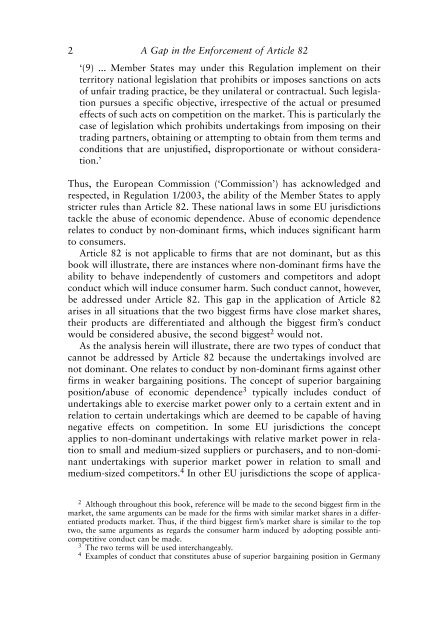Abuse of Economic Dependence - The Centre for European Policy ...
Abuse of Economic Dependence - The Centre for European Policy ...
Abuse of Economic Dependence - The Centre for European Policy ...
Create successful ePaper yourself
Turn your PDF publications into a flip-book with our unique Google optimized e-Paper software.
2 A Gap in the En<strong>for</strong>cement <strong>of</strong> Article 82<br />
‘(9) ... Member States may under this Regulation implement on their<br />
territory national legislation that prohibits or imposes sanctions on acts<br />
<strong>of</strong> unfair trading practice, be they unilateral or contractual. Such legislation<br />
pursues a specific objective, irrespective <strong>of</strong> the actual or presumed<br />
effects <strong>of</strong> such acts on competition on the market. This is particularly the<br />
case <strong>of</strong> legislation which prohibits undertakings from imposing on their<br />
trading partners, obtaining or attempting to obtain from them terms and<br />
conditions that are unjustified, disproportionate or without consideration.’<br />
Thus, the <strong>European</strong> Commission (‘Commission’) has acknowledged and<br />
respected, in Regulation 1/2003, the ability <strong>of</strong> the Member States to apply<br />
stricter rules than Article 82. <strong>The</strong>se national laws in some EU jurisdictions<br />
tackle the abuse <strong>of</strong> economic dependence. <strong>Abuse</strong> <strong>of</strong> economic dependence<br />
relates to conduct by non-dominant firms, which induces significant harm<br />
to consumers.<br />
Article 82 is not applicable to firms that are not dominant, but as this<br />
book will illustrate, there are instances where non-dominant firms have the<br />
ability to behave independently <strong>of</strong> customers and competitors and adopt<br />
conduct which will induce consumer harm. Such conduct cannot, however,<br />
be addressed under Article 82. This gap in the application <strong>of</strong> Article 82<br />
arises in all situations that the two biggest firms have close market shares,<br />
their products are differentiated and although the biggest firm’s conduct<br />
would be considered abusive, the second biggest 2 would not.<br />
As the analysis herein will illustrate, there are two types <strong>of</strong> conduct that<br />
cannot be addressed by Article 82 because the undertakings involved are<br />
not dominant. One relates to conduct by non-dominant firms against other<br />
firms in weaker bargaining positions. <strong>The</strong> concept <strong>of</strong> superior bargaining<br />
position/abuse <strong>of</strong> economic dependence 3 typically includes conduct <strong>of</strong><br />
undertakings able to exercise market power only to a certain extent and in<br />
relation to certain undertakings which are deemed to be capable <strong>of</strong> having<br />
negative effects on competition. In some EU jurisdictions the concept<br />
applies to non-dominant undertakings with relative market power in relation<br />
to small and medium-sized suppliers or purchasers, and to non-dominant<br />
undertakings with superior market power in relation to small and<br />
medium-sized competitors. 4 In other EU jurisdictions the scope <strong>of</strong> applica-<br />
2 Although throughout this book, reference will be made to the second biggest firm in the<br />
market, the same arguments can be made <strong>for</strong> the firms with similar market shares in a differentiated<br />
products market. Thus, if the third biggest firm’s market share is similar to the top<br />
two, the same arguments as regards the consumer harm induced by adopting possible anticompetitive<br />
conduct can be made.<br />
3 <strong>The</strong> two terms will be used interchangeably.<br />
4 Examples <strong>of</strong> conduct that constitutes abuse <strong>of</strong> superior bargaining position in Germany


